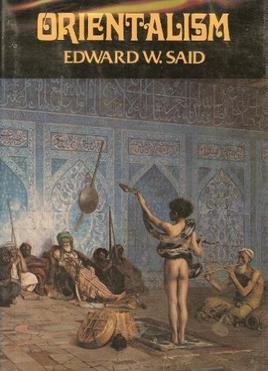
In art history, literature and cultural studies, Orientalism is the imitation or depiction of aspects of the Eastern world. These depictions are usually made by writers, designers, and artists from the Western world. In particular, Orientalist painting, depicts the Middle East, and it was one of the many specialties of 19th-century academic art, and the literature of Western countries was influenced by a similar interest in Oriental themes.

Antoine Isaac, Baron Silvestre de Sacy, was a French nobleman, linguist and orientalist. His son, Ustazade Silvestre de Sacy, became a journalist.

The Orient is a term for the East in relation to Europe, traditionally comprising anything belonging to the Eastern world. It is the antonym of Occident, the Western World. In English, it is largely a metonym for, and coterminous with, the continent of Asia, loosely classified into the Southwest Asia, Southeast Asia, South Asia, Central Asia, East Asia, and sometimes including the Caucasus. Originally, the term Orient was used to designate only the Near East, and later its meaning evolved and expanded, designating also Central Asia, Southwest Asia, South Asia, Southeast Asia, or the Far East.
Salvador, meaning "salvation" in Catalan, Spanish, and Portuguese may refer to:
Robert Graham Irwin is a British historian, novelist, and writer on Arabic literature.

Orientalism is a 1978 book by Edward W. Said, in which the author establishes the term "Orientalism" as a critical concept to describe the West's commonly contemptuous depiction and portrayal of The East, i.e. the Orient. Societies and peoples of the Orient are those who inhabit the places of Asia, North Africa, and the Middle East. Said argues that Orientalism, in the sense of the Western scholarship about the Eastern World, is inextricably tied to the imperialist societies who produced it, which makes much Orientalist work inherently political and servile to power.

Oriental studies is the academic field that studies Near Eastern and Far Eastern societies and cultures, languages, peoples, history and archaeology. In recent years, the subject has often been turned into the newer terms of Middle Eastern studies and Asian studies. Traditional Oriental studies in Europe is today generally focused on the discipline of Islamic studies, and the study of China, especially traditional China, is often called Sinology. The study of East Asia in general, especially in the United States, is often called East Asian studies.
Jonathan Scott may refer to:

Jean-Joseph Benjamin-Constant, born Jean-Joseph Constant, was a French painter and etcher best known for his Oriental subjects and portraits.
William Marsden may refer to:
Peter Jensen may refer to:

Edward Wadie Said was a Palestinian American academic, literary critic and political activist. A professor of literature at Columbia University he was among the founders of postcolonial studies. Born in Mandatory Palestine, he was a citizen of the United States by way of his father, a U.S. Army veteran.
David Wilkins may refer to:
Samuel or Sam Davis may refer to:
Alexander Johnston may refer to:
George Phillips may refer to:
Fuck is an English term for the act of sexual intercourse, also used as an intensifier or interjection, and generally considered vulgar.
Orthodox Church may refer to:
Thomas Yates may refer to:
This page is based on this
Wikipedia article Text is available under the
CC BY-SA 4.0 license; additional terms may apply.
Images, videos and audio are available under their respective licenses.






